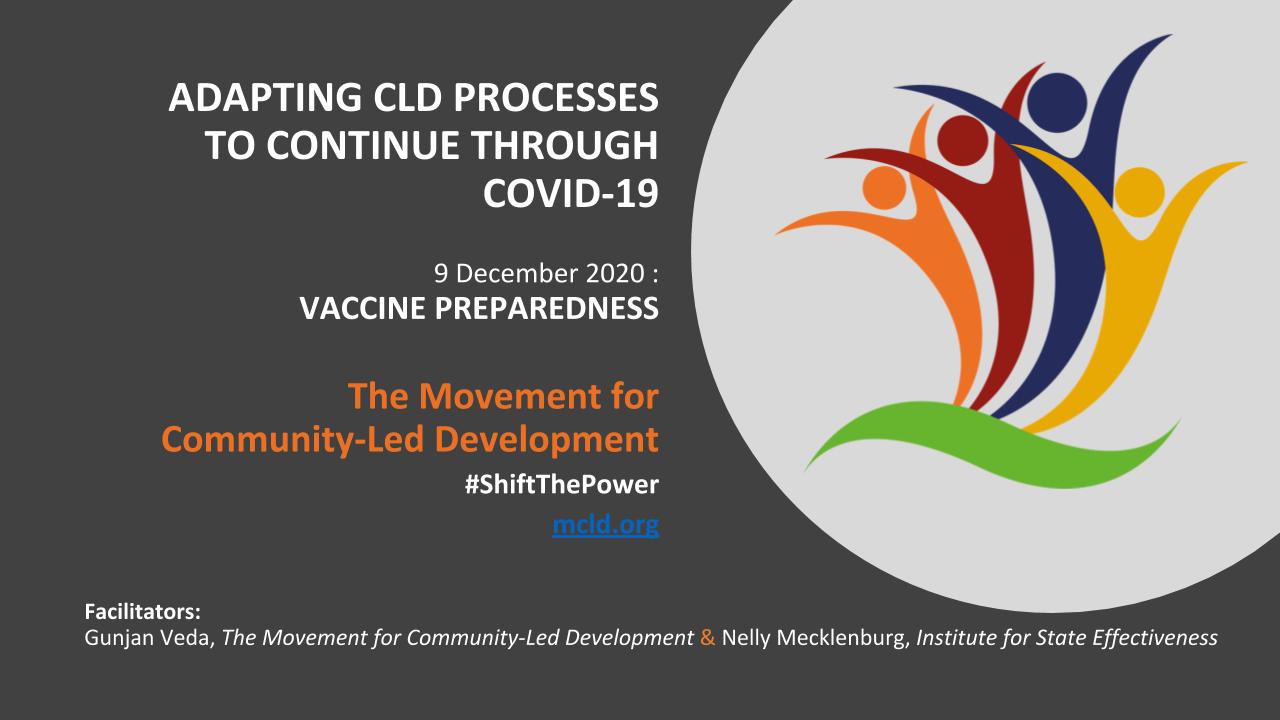Adapting CLD Processes to Continue Through COVID-19: Vaccine Preparedness
December 9, 2020
The ninth global CLD and Covid-19 call hosted by the Movement for Community Led Development (MCLD) brought together MCLD members and experts from global health and civil society organizations to discuss the development of COVID-19 vaccines and the role of community organizations in supporting immunization roll-out and advocating for safe, equitable access for communities.
Panelists
- Suhayla Bazbaz, Founder & Director, Community Cohesion and Social Innovation
- Dr. Rashed Shah, Child Health Advisor, Save the Children
- Carey Westgate, Deputy Director, Community Health Impact Coalition
Moderators: Gunjan Veda, Movement for Community Led Development and Nelly Mecklenburg, Institute for State Effectiveness
African Union’s CDC Mechanisms for COVID-19
The African’s Union’s (AU) Centre for Disease Control and Prevention (CDC) has established several mechanisms to aid in the rollout and uptake of COVID-19 vaccinations across the continent. This includes an online rumor tracking system to help dispel misinformation shared on social media regarding vaccinations, a vaccine development and access strategy to promote African country-level engagement for equitable vaccine access, and a risk communication and community engagement working group as part of its Africa Task Force for Coronavirus (AFTCOR). The AU CDC is conducting a vaccine perception survey in South Africa, the Democratic Republic of Congo, Cote de Ivoire, and Nigeria to inform community engagement strategies and has launched a vaccine acceptability media campaign. MCLD is committed to work with the AU CDC on its community-level engagement around COVID-19 and hopes to promote deeper involvement in the organization’s vaccination awareness and rollout strategy.
The Role of Community Organizations in Vaccination Programs
Describing his experience working in Bangladesh, Kenya, and other nations, Dr. Shah iterated that civil society and community organizations are crucial for vaccination programs. Although these vaccination programs are often administered by ministries of public health, officials rely on community organizations in reaching remote geographic areas where governance presence and access is minimal. The importance of COVID-19 vaccinations makes this government-community engagement even more vital. Dr. Shah described how community organizations play a crucial role in both sharing information, dispelling rumors, and conducting door-knocking campaigns about vaccinations as well as logistically supporting public health authorities with transportation and community access.
While international news around vaccinations has centered on their swift development and approval – such as this week’s promising news from Pfizer and Moderna – Ms. Westgate stressed that supporting community health workers (CHWs) will be vital to equitable widespread distribution. This is especially true in terms of resourcing, where the availability of personal protective equipment (PPE) and adequate renumeration has continued to be a challenge for CHWs throughout the pandemic. As CHWs are the frontlines for the planning, targeting and mobilization for the COVID-19 vaccine, it is vital that global and national government public health authorities properly support and resource CHWs as they continue working in communities. Regarding digital technology to support vaccination programs, Ms. Westgate
described how the Community Health Impact Coalition has begun working with partners on several tools, such as platforms for tracking vaccinations (where each individual requires two doses) and chatbots to provide timely information. Dr. Shah added that Save the Children is working on ThinkMD tools for CHWs to screen patients.
Speaking to this importance of supporting community organizations for COVID-19 vaccinations, Ms. Bazbaz explained how a lack of support for and engagement with community organizations in Mexico has hampered the country’s vaccine rollout. While like in many countries, Mexico’s government has said COVID-19 vaccinations will be universal and free to the public, there has been no engagement with community organizations on a national vaccination policy. Moreover, it is unclear how many doses the Mexican government has bought and for what price, which Ms. Bazbaz described as a human rights issue as citizens have a right to know how much the government has spent. According to Ms. Babaz, this lack of community engagement around messaging and equitable uptake will impact the vaccination program’s uptake and therefore effectiveness. For example, while the government has stated they will first prioritize vaccinations for healthcare workers and those 80 years of age and over, there is no strategy to provide vaccinations to individuals with co-morbidities who do not meet either of those criteria. Moreover, there is no evidence of a geographic prioritization strategy for vaccine rollout, despite disparities in the virus’s severity across regions and in the government’s response to the pandemic between more high-populated areas and locations with little to no health services.
Breakout Groups
Participants on the call discussed in breakout groups how they envision their role in vaccine operationalization, what they can do to ensure equitable access, and the information they need to effectively fulfill their roles. The primary takeaway from all the breakout groups was that CSOs still require more information on the vaccines and their efficacy. Often community organizations are tasked with “pushing” vaccines and other public health measures but are left out of meaningful dialogue around the science and strategy. Participants iterated public health authorities need to better engage CSOs to reach a consensus on vaccine rollout. In this way, CSOs can more confidently reassure communities that they know the vaccine works and highlight its importance, instead of only reiterating talking points they have received from government and health authorities. This is of particular importance for COVID-19, as vaccine trials have been overwhelming conducted with adult, European/Western populations, and participants expressed concern about side effects for those with significantly different living conditions or co-morbidities.
Agreeing with the guest speakers, the breakout groups also emphasized the importance of community organizations in vaccine operationalization. Particularly, participants iterated the importance of CSOs leveraging their existing networks and access to ensure that vaccine information and supplies are accessible to citizens and tailored to local contexts and languages. This effort will require new levels of collective action among community organizations to fully engage communities and government authorities in advocating for equitable vaccine distribution.


